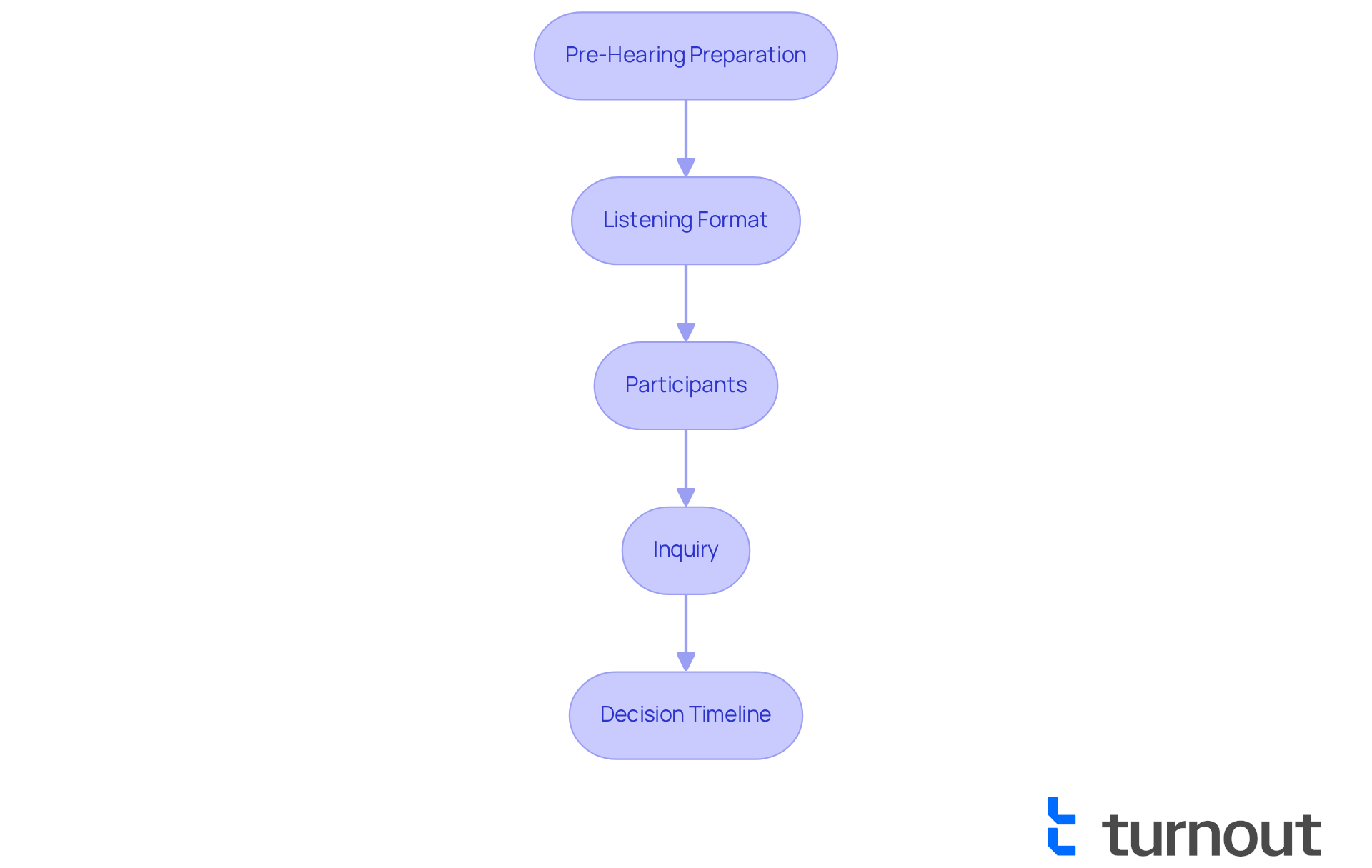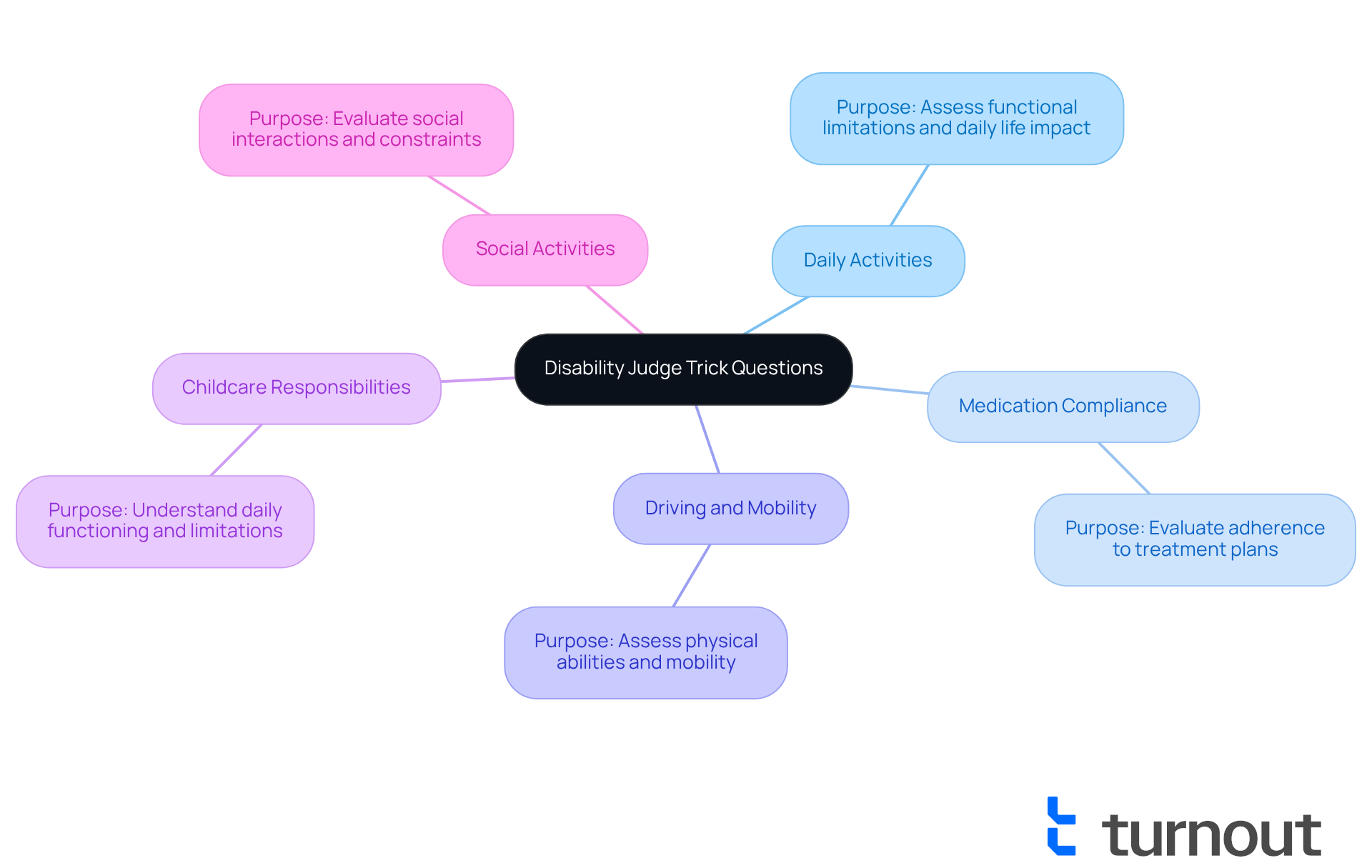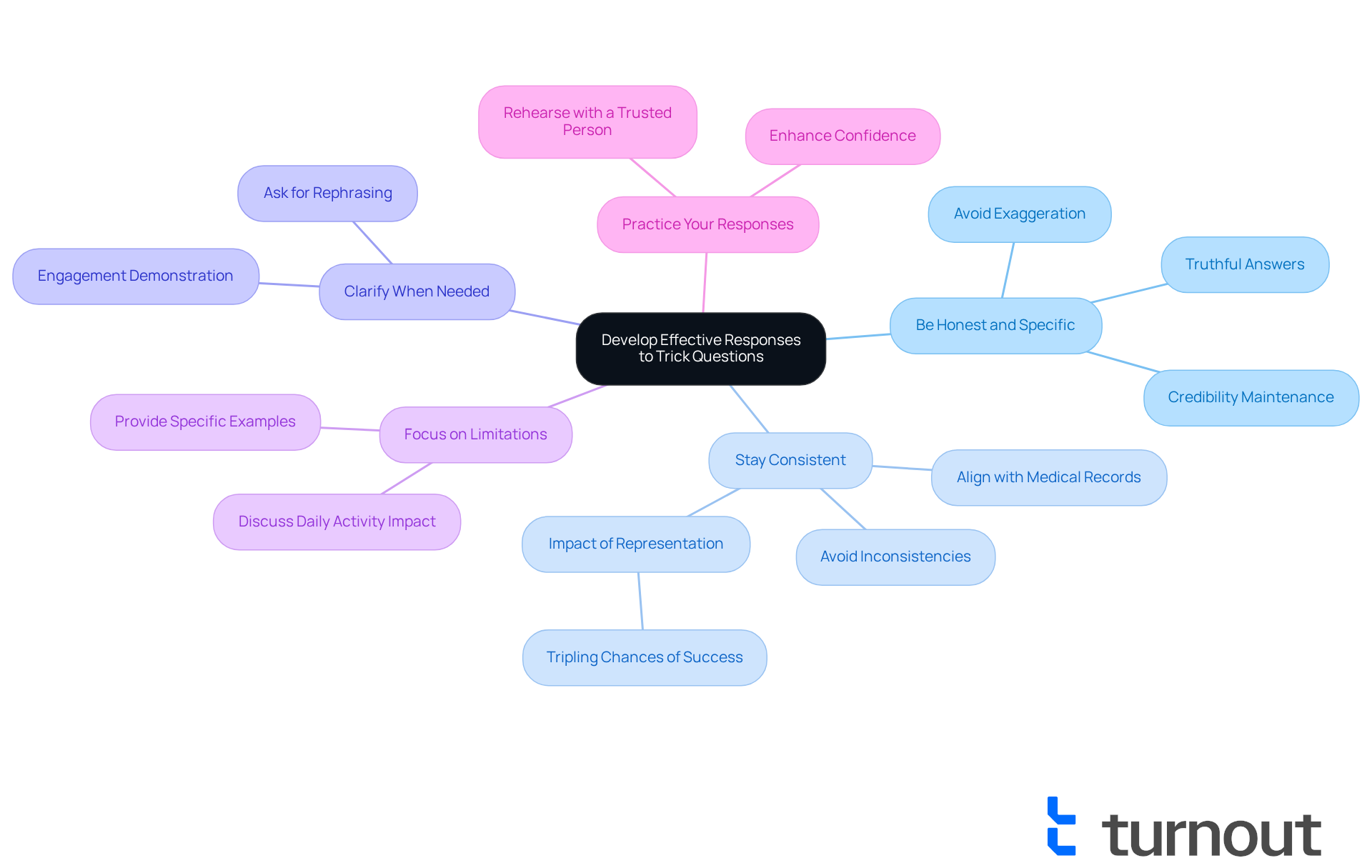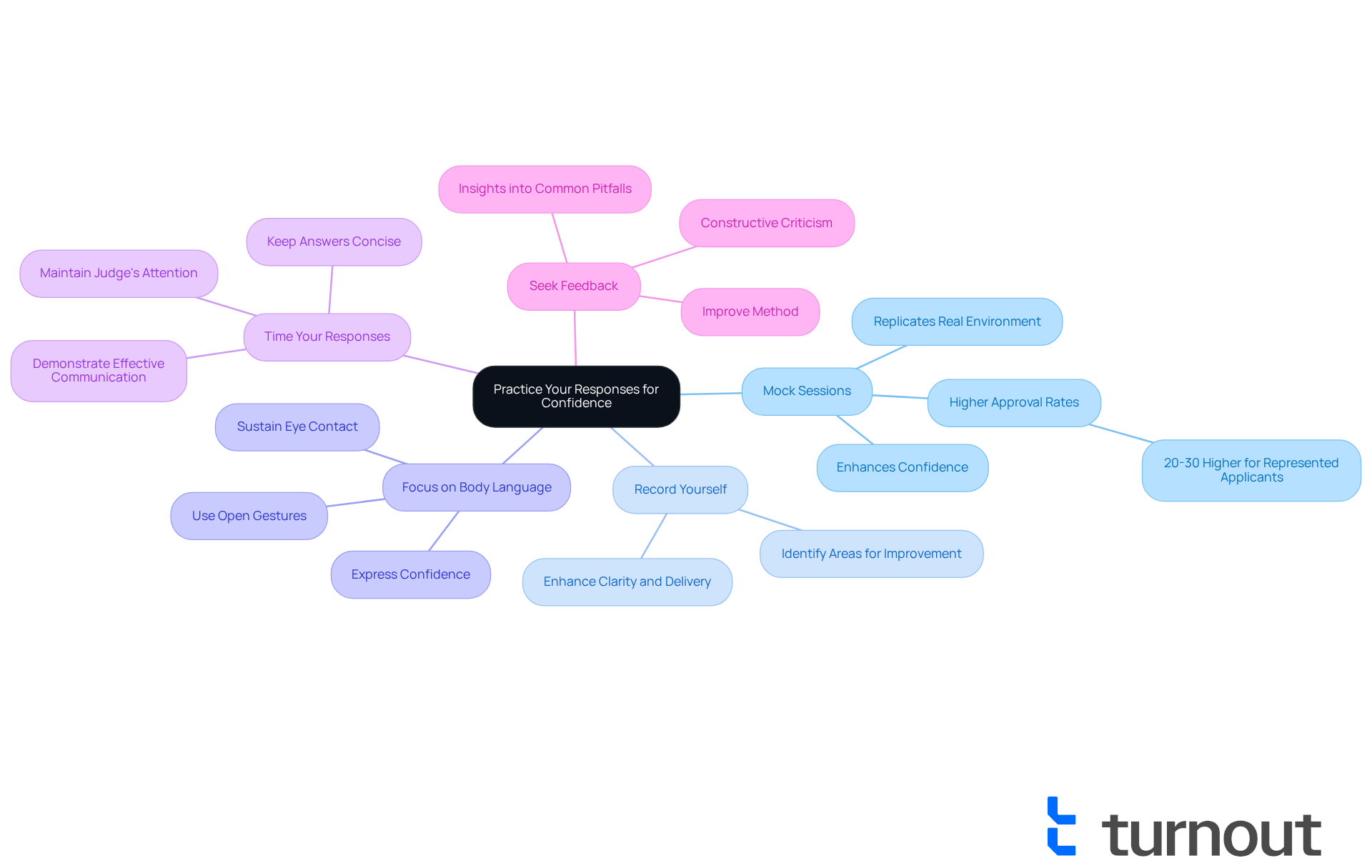Overview
Navigating the disability hearing process can feel overwhelming, especially when faced with tricky questions from judges. We understand that this journey may be filled with uncertainty and anxiety. That’s why thorough preparation is essential. By preparing well, you can respond honestly and consistently, which builds your confidence and credibility during the hearing.
Practice is key. The more you practice, the more comfortable you will feel. This preparation can significantly influence the outcome of your case. Remember, you are not alone in this journey. We’re here to help you every step of the way, ensuring that you feel supported and ready to face the challenges ahead. Together, we can work towards a successful hearing.
Introduction
Navigating the disability hearing process can feel overwhelming. We understand that the prospect of facing tricky questions from judges—questions meant to test the validity of your claims—can add to that anxiety. However, grasping the intricacies of this process can empower you to present your case more effectively.
What strategies can you employ to not only tackle these challenging questions but also bolster your credibility and confidence in such a high-stakes environment? We're here to help you through this journey.
Understand the Disability Hearing Process
Navigating the disability hearing process can feel overwhelming, especially when trying to avoid , but understanding the key steps can help ease your journey. Here’s what to expect:
- : Start by gathering all relevant documents, such as medical records and personal statements. This preparation is crucial for presenting a strong case. Comprehensive medical documentation can significantly increase your chances of success.
- : It’s important to know that the session is typically casual. An Administrative Law Judge (ALJ) will lead the discussion by asking disability judge trick questions about your disability and its impact on your daily life. Familiarizing yourself with this format can help alleviate anxiety and enhance your performance.
- Participants: Understanding who will attend the hearing is vital. Familiarize yourself with the presiding official, any witnesses, and possibly a vocational expert. Knowing the roles of each participant can make you feel more at ease during the proceedings.
- Inquiry: Be prepared for the disability judge to ask trick questions regarding your medical history, daily activities, and limitations. This part of the process is essential, as your responses will help the evaluator determine your qualification for benefits. Clear and consistent communication about how your condition affects your daily life is vital.
- : After the session, the judge will take time to examine the case before delivering a ruling, which may take one to three months. Understanding this timeline helps set realistic expectations about when you might receive your benefits.
can significantly influence the outcome of your case. It allows you to present a compelling narrative supported by strong evidence. Remember, as advocates often say, "Avoiding critical errors can mean the difference between approval and denial." You are not alone in this journey; we’re here to help you every step of the way.

Identify Common Trick Questions from Judges
During , judges often use to evaluate the reliability and coherence of your testimony. Understanding the disability judge trick questions can make a significant difference in how you present your case. Here are some common examples:
- Daily Activities: "What do you do on a typical day?" This question helps assess your and allows the judge to understand how your condition impacts your daily life.
- : "Are you taking all your medications as prescribed?" This question evaluates your adherence to treatment plans, which is crucial for determining the severity of your condition.
- Driving and Mobility: "Can you drive? How far do you drive?" This inquiry assesses your physical abilities and mobility, providing insight into your overall functioning.
- : "Do you take care of any children?" This question can reveal your , highlighting how your condition affects your responsibilities.
- : "Do you engage in hobbies or social activities?" This inquiry helps the judge understand your social interactions and constraints, which are essential for evaluating your overall well-being.
We understand that responding to these inquiries, particularly disability judge trick questions, can feel daunting. However, formulating thoughtful and sincere replies can greatly enhance your credibility when addressing disability judge trick questions during the hearing. Remember, when facing disability judge trick questions, judges are looking for consistency in your answers, so it’s vital to remain truthful and clear throughout the process. Engaging in practice hearings can help you feel more comfortable with these questions and improve your responses.
It's also important to avoid exaggerating your symptoms, as this can undermine your credibility. Inconsistent answers can lead to doubts about your claims, so maintaining honesty and consistency is essential. You are not alone in this journey; we’re here to help you navigate these challenges with confidence.

Develop Effective Responses to Trick Questions
When responding to , it’s essential to consider a few that can help you navigate this challenging process:
- Be Honest and Specific: It’s important to that accurately reflect your capabilities and limitations. Avoid exaggerating or downplaying your condition; honesty is crucial for maintaining credibility. Remember, as one expert wisely noted, "The golden rule in cases is to always be honest."
- Stay Consistent: Ensure your responses align with your previous statements and medical records. Inconsistencies can raise red flags and weaken your case, as decision-makers are trained to detect discrepancies. It’s comforting to know that having a representative can triple your chances of winning a .
- Clarify When Needed: If a question is unclear, don’t hesitate to ask the judge to rephrase it. This shows your engagement and commitment to providing accurate information, which is vital in these situations.
- Focus on Limitations: When discussing daily activities, your ability to perform those tasks. For example, instead of simply stating that you can drive, explain how long you can drive before needing a break. This illustrates the real effects of your condition and helps others understand your experience.
- Practice Your Responses: Rehearse your answers to common trick questions with a trusted friend or advocate. This practice can enhance your confidence and ensure clarity in your responses, making you more prepared for the session that may include disability judge trick questions. As another specialist suggests, "Never exaggerate, downplay, estimate, or express anything you can’t objectively demonstrate is accurate during your ."
By applying these caring strategies, you can during your disability review. Remember, you are not alone in this journey, and we’re here to help you every step of the way.

Practice Your Responses for Confidence
To practice your responses effectively, we understand that the journey can feel overwhelming. Here are some supportive strategies to help you :
- : Conduct mock sessions with a friend or family member acting as the judge. This replicates the real environment, allowing you to become familiar with the format. Engaging in these practice sessions can significantly enhance your confidence and readiness. Research shows that represented applicants achieve approval rates 20-30% higher than those proceeding alone, underscoring the importance of .
- Record Yourself: Use a video or audio recorder to capture your responses. Reviewing these recordings allows you to identify areas for improvement in clarity and delivery, ensuring your answers are both concise and impactful.
- Focus on Body Language: Pay attention to your body language during practice. Sustaining eye contact and employing open gestures can express confidence, which is essential during the session. Experts emphasize that can influence the perception of credibility and sincerity, making it an essential aspect of your presentation.
- Time Your Responses: Keep your answers concise. Practice delivering your responses within a reasonable time frame to avoid rambling. This not only helps maintain the judge's attention but also demonstrates your ability to communicate effectively under pressure. In , which usually last one to two hours, being concise is essential to navigate .
- Seek Feedback: After practicing, ask for on your responses and demeanor. Use this feedback to improve your method prior to the actual session. Engaging with knowledgeable individuals can provide insights into common pitfalls and effective strategies, enhancing your overall presentation. Remember, following the session, there is usually a waiting period of up to 60 days for the judge's decision, making thorough preparation essential.
Incorporating these techniques into your preparation can significantly improve your chances of success during the hearing process. You're not alone in this journey, and every step of the way.

Conclusion
Navigating the disability hearing process can feel overwhelming. We understand that it requires not only an understanding of its structure but also effective preparation for the challenging questions that judges often ask. By focusing on pre-hearing preparation, familiarizing yourself with common trick questions, and developing thoughtful responses, you can significantly enhance your chances of success. Though the journey may seem daunting, with the right strategies, it becomes a manageable and empowering experience.
Gathering relevant documentation is crucial. Recognizing the casual format of hearings and being aware of the participants involved can make a big difference. Honesty, consistency, and clarity in your responses are essential. Practicing your responses through mock sessions and recording yourself can provide valuable feedback and build confidence, ensuring you are well-prepared to address the inquiries posed by judges.
Ultimately, approaching the disability hearing with diligence and preparation can truly make all the difference. Embracing these strategies not only aids in presenting a compelling case but also reinforces the notion that you are not alone in this journey. Seeking support and guidance throughout the process can lead to a more favorable outcome, empowering you to advocate for your rights and secure the benefits you deserve.
Frequently Asked Questions
What is the first step in the disability hearing process?
The first step is pre-hearing preparation, which involves gathering all relevant documents such as medical records and personal statements to present a strong case.
What is the typical format of a disability hearing?
The session is typically casual, led by an Administrative Law Judge (ALJ) who will ask questions about your disability and its impact on your daily life.
Who will be present at the hearing?
Participants may include the presiding official (the ALJ), any witnesses, and possibly a vocational expert. Familiarizing yourself with their roles can help ease your anxiety.
What types of questions can I expect from the disability judge?
You should be prepared for trick questions regarding your medical history, daily activities, and limitations, as your responses will help determine your qualification for benefits.
How long does it take to receive a decision after the hearing?
The judge will take one to three months to examine the case and deliver a ruling, so it's important to set realistic expectations about when you might receive your benefits.
Why is pre-hearing preparation important?
Effective pre-hearing preparation can significantly influence the outcome of your case by allowing you to present a compelling narrative supported by strong evidence, which can mean the difference between approval and denial.




